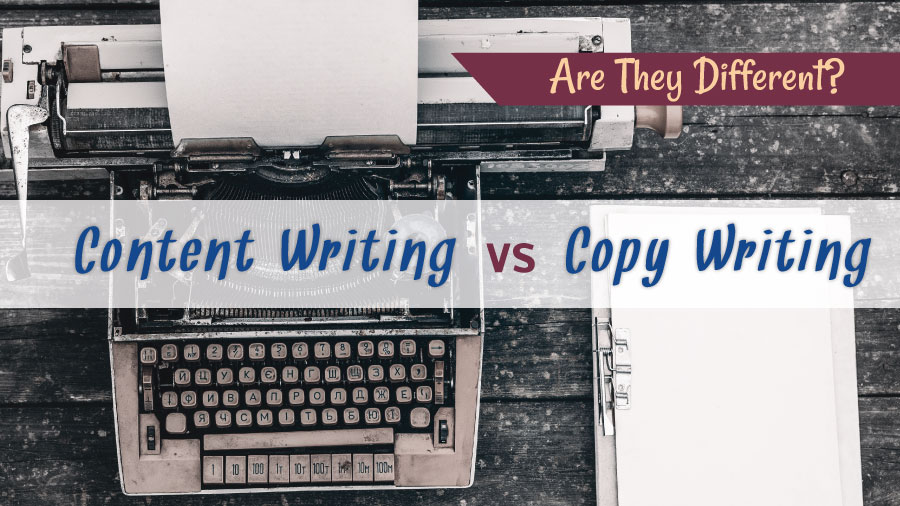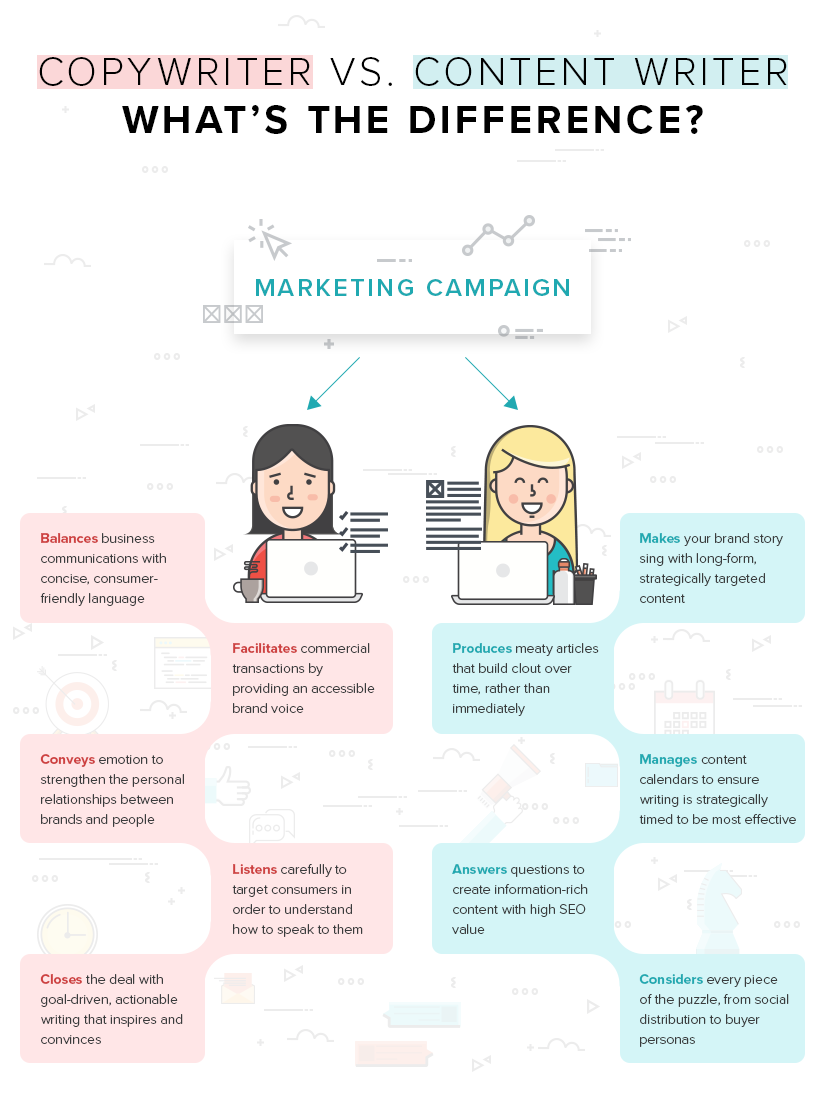Copywriting vs. Content Writing: Are They Different? «SEOPressor – SEO Plugin for WordPress

Copywriting vs. Content Writing: Are They Different?
Copywriting and content writing are intertwining words to market products and services. But they actually have very different purposes in terms of marketing, let’s see what the differences are.

1. What is a copy and what is content?

First things first, how can we distinguish a copy from a content?
Copy – A copy comes from the old form of advertising such as brochures, emails, bulletin boards, etc. The main purpose of a copy is to sell.
See those gif banners at the top, bottom, and sides of a website? Those are a copy. Do the ads on your bus wall stop telling you how refreshing a drink is? That is also a copy.
Due to limited space and the small amount of time to grab a potential customer’s attention, a copy is generally kept as short and impactful as possible.
Content: what you are reading at the moment is content.
Content is usually informative or entertaining, with a couple thousand words for a multitude of purposes, such as answering a question, sharing an opinion, providing guidance, etc.
Content writing in the inbound marketing sense aims to target search engine intent and feature prominently on the search engine results page. This is how a certain website can passively attract visitors and slowly transform them into customers.
2. A copy aims to get instant results, while content is a long-term strategy.

Content writing is a big part of inbound marketing (a term coined by Hubspot) that aims to warm potential customers by getting their attention and continuing to provide them with informative or entertaining content that is tailored to their interests.
What this plan should achieve is that over time, your visitors will turn to returning visitors, and eventually to a potential customer or prospect.
Copywriting, on the other hand, is more of an old-school direct marketing approach. Copies are often structured to be emotionally moving and demanding. Their motive is very simple, they need the customer to take an action. Whether it’s subscribing to a newsletter or making a purchase, a copy aims to push the reader to do it and do it now.
3. Copywriting is usually shorter than content writing.
It’s not unusual to have a piece of content, be it a detailed informational snippet about what’s on the SEO page or coverage on the latest big Android update to hit thousands of words.
Hubspot’s own study found that the sweet spot for content to rank high on the search results page is 2,500 words.
Copywriting, on the other hand, generally works on shorter mediums like mailers or cold call emails, so it’s important to include the greatest impact in the fewest number of words. That way, a copy can instantly grab the reader’s attention.
4. Copywriting must maintain a consistent brand voice, while not required for content writing.

You can probably say it’s a Nike ad for their Just Do It campaign without explicitly telling you it’s Nike, right? A copy is closely associated with a brand name and needs to maintain the voice of the brand in order to take root in the consumer’s mind.
In addition, a copy is often combined with other visual aspects such as the ad color theme, font, logo, etc. So to match the other elements around it, a copy must maintain a consistent brand voice. .
Content writing, on the other hand, doesn’t need to maintain a brand voice. The goal of creating content is to build trust and authority to encourage readers to get to know your brand.
Which means that there are certain styles that it is advisable to use when creating content. Some content writers prefer to be more casual and use a conversational tone. For some more academic or scholastic content, they may target an academic writing style.
For content writing, as long as the points are clearly delivered and the piece is easy to read and follow, all is well.
5. Copywriting works on the information provided, while content writing involves a great deal of research.

Due to the specific nature of copywriting, they tend to work with what the client gives and expand little from there.
Especially when it comes to promotional copy of a product, the product specifications are often what needs to be shown. That is why copywriters write their copy using what is given to them and their mission is to make the information as attractive as possible.
Content writing is very different. In the sense that content writing is 70% research and 30% writing.
Many times, a content writer is tasked with writing a topic that they know nothing about. Things like rock drills, content management software, or cryptocurrency trading platforms. Topics in a specific niche that require technical knowledge.
That’s why content creation always begins with content research. And not only that, content writers should also do keyword research to make sure their content is optimized and highly visible and valuable to search engines and readers alike.
6. The copywriter follows a deadline, the content writer writes according to the content calendar

Content writing is a long-term plan that involves a lot of search intent matching, keyword research, following up with the latest SEO techniques, spreadsheets, and a content calendar. Posts are scheduled according to topics or a certain series of topics.
Because it is an ever-evolving process, content writers need to plan everything in advance to focus on pumping content, relentlessly. They often take an active role in planning the content calendar at their own pace.
Copywriter, on the other hand, follows a much more “on demand” schedule. Usually they are given projects that must be completed on time. Due to their much more aggressive marketing nature, they need to keep up with a promotion / marketing period.
There are probably some clients who need the job as soon as possible. And a few other projects with comments that need editing in the mailbox. All of these have a deadline to follow.
7. Copywriting is creative while content writing is informative

Due to the many limitations of a copy, such as length, where it appears, what you need to accomplish, what other elements you need to cooperate with, etc., a copywriter must be absolutely creative in making words all of that.
There really is no more challenging job than creating a copy that is both persuasive and emotional with just the right amount of information to keep you hanging and still fit a 300×50 banner ad.
That is why copywriting is undoubtedly a creative job.
Content writing, especially inbound writing, is about creating the relevant content that responds to a certain search query. They call this targeting by search intent. The reason behind this is that if someone finds your content while searching for something on the internet, they will start to have some kind of trust in you and that trust will be the impetus for them to choose you when they need to buy a product or service. .
This is why the content needs to be informative, detailed, and even technical in some cases.
In conclusion…
A copywriter and a content creator do very different things when you look at them as totally different and separate jobs. But the thing is, a lot of people actually blur the line between a copywriter and a content creator because, hey, they’re just writing, right?
There are in-house copywriters or content creators for marketing companies, advertising companies or whatever, where the two jobs are also clearly recognized, two jobs. But for many smaller companies or freelance writers, whatever writing involves, they generally accept it.
If you need to hire a copywriter or a content creator but not both, be very clear about the goal you want to achieve.
If you need an absolutely eye-catching copy for a convertible banner ad , you need a copywriter.
Do you need someone to publish consistent blog posts on your specific product niche? So a content creator.
On the other hand, if you are thinking of advancing in this career of being a word creator, be very clear if you are more of a creative person who can write great headlines for a single copy and be prepared for none of that. will be accepted. Or if you’re good at researching things and have the confidence to write like an expert on a topic you just learned 24 hours ago.
Are you good at both? Well why not!
Let’s sum up this post with a great infographic from MarketingProfs

Related links



